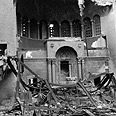
Uproar over rightist leader's anti-Jew slur
Vienna's Jewish community demands investigation into Austrian politicians' comparison of protests against fancy ball that attracts extremists to Nazis' persecution of Jews. Freedom Party: No harm meant
Far-right Austrian politicians were widely criticized Monday for comparing protests against a fancy ball that attracts extremists to the Nazis' persecution of Jews.
Vienna's Jewish community demanded an investigation into the remarks but the Freedom Pary insisted no harm was meant.
The comments by Freedom Party leader Heinz-Christian Strache and an associate were first reported Sunday on the website of the daily Der Standard, but they drew little attention until Monday.
The furor extended the controversy over Friday's far-right ball, which attracts guests who include the neo-Nazi fringe and was held this year on the same day the world pays tribute to victims of the Holocaust.
Police recorded only isolated violent incidents Friday from demonstrators outside the Viennese palace where the ball was being held.
But Strache was quoted as saying the violence was "like Kristallnacht," referring to the 1938 anti-Semitic riots across Germany and parts of Austria that left streets strewn with broken glass from the windows of Jewish-owned property and synagogues. Kristallnacht was an ominous sign of the Holocaust to follow.
"We are the new Jews," Strache declared to other ball guests, according to Austrian media.
Strache associate Klaus Nittmann, meanwhile, was quoted as saying "whoever works for this ball immediately gets a Jew star pinned on him" – a reference to the yellow stars Jews were forced to wear under Nazi rule.
Austria's Jewish community demanded that the state prosecutor investigate the comments and urged Strache to give up his parliamentary immunity from legal action.
Karl Oelligner of the opposition Green Party suggested that such comments can only come from someone who "has either lost his marbles or is trying to trivialize the horrors of Nazi rule."
Hannes Rauch, whose centrist People's Party is in the government coalition, called Strache's words "an open slap in the face for all those who were victims of the criminal National Socialist regime."
Austria's second-strongest political force
Freedom Party officials dismissed the criticism. Spokesman Harald Vilimsky spoke of "artificial and ridiculous outrage," adding that Strache only meant the denunciations of ball supporters and attacks on their property are reminiscent of "the horrible reports about the sinister era of National Socialism."
Strache, he said, did not intend to play down "the agony that was forced upon the Jews."
Austria has moved from its postwar portrayal of being Nazi Germany's first victim to acknowledging that it was Hitler's willing partner. Most young Austrians reject Nazi ideology and condemn the part their parents might have played in the Holocaust.
At the same time, the rightist-populist Freedom Party – whose supporters range from those disillusioned with more traditional parties to Islamophobes and Holocaust deniers – has become Austria's second-strongest political force.
Although the annual ball regularly comes under criticism, its overlap this year with worldwide commemorations of the Holocaust had increased the pressure on organizers and attendees.
Because it was listed among other champagne-laced Viennese balls, an Austrian committee reporting to UNESCO, the UN's culture organization, struck all the balls from its list of Austria's noteworthy traditions earlier this month.










